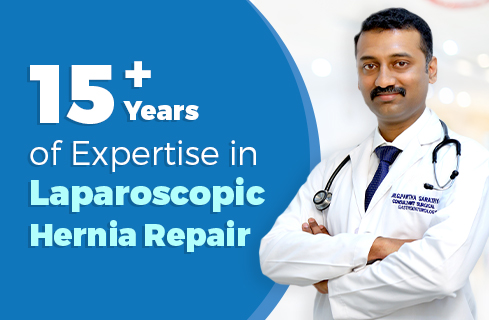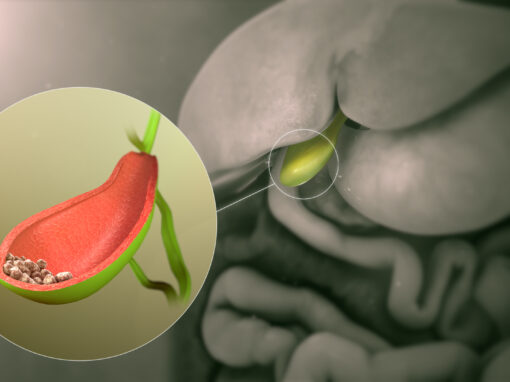Hiatal Hernia Surgery in Hyderabad
Hiatal hernia surgery is one of the common procedures we perform at our center. Dr. Parthasarahy is one of the best hiatal hernia surgeons in Hyderabad. Dr. Parthasarathy and the team have performed hundreds of complex hiatal hernia surgeries at our center. We make use of advanced laparoscopic surgery for a hiatal hernia to deliver the best possible result to our patients. Right from the moment of initial consultation to surgery and aftercare, we provide an unmatched personalised experience for our hiatal hernia patients.

What is a Hiatal Hernia?
A hiatal hernia occurs when the top section of the stomach protrudes through the big muscle that divides the belly from the chest. The muscle is known as the diaphragm.
The diaphragm contains a tiny hole known as a hiatus. The oesophagus, a tube used to ingest food, travels through the gap before joining the stomach. In a hiatal hernia, the stomach pushes up through the gap into the chest.
A minor hiatal hernia seldom causes difficulties. You may be unaware that you have one until your healthcare team discovers it when screening for another issue.
However, a big hiatal hernia can cause food and acid to back up into the oesophagus. This may induce heartburn. Self-care techniques or medications can generally alleviate them.
An extremely big hiatal hernia may necessitate surgery.
What are the symptoms of Hiatal Hernia?
Most tiny hiatal hernias produce no symptoms. However, bigger hiatal hernias can cause:
- The backward flow of ingested food or liquids into the mouth is known as regurgitation.
- Acid reflux.
- Trouble swallowing.
- Chest or abdominal ache.
- Feeling full shortly after eating.
- Shortness of breath.
- Bloody vomit or black faeces may indicate intestinal haemorrhage.
How is Hiatal Hernia Diagnosed?
A hiatal hernia is frequently identified during a test or treatment to diagnose heartburn or pain in the chest or upper abdomen. These tests or procedures include the following:
An X-ray of the upper digestive tract. X-rays are obtained after you consume a gritty liquid that covers and fills the interior lining of your digestive tract. The covering enables your healthcare staff to view an outline of your oesophagus, stomach, and upper intestine.
An endoscopy is a technique that examines the oesophagus and stomach. Endoscopy is a treatment that examines your digestive tract using a long, thin tube and a tiny camera known as an endoscope. The endoscope is sent down your throat and looks into the inside of your oesophagus and stomach while checking for inflammation.
Esophageal manometry is a test that measures muscular contractions in the oesophagus. This test detects the rhythmic muscular contractions in your oesophagus while you swallow. Esophageal manometry assesses the coordination and force exerted by your esophageal muscles.
What are the treatment options for Hiatal Hernia?
Most people with a hiatal hernia have no symptoms and will not require treatment. If you have symptoms like regular heartburn and acid reflux, you may require medication or surgery.
Medicines
If you have heartburn and acid reflux, your doctor may recommend:
Antacids neutralise gastric acids. Antacids may offer immediate relief. Overuse of some antacids might result in adverse effects such as diarrhoea or renal issues.
Medicines that decrease acid production. These drugs are referred to as H-2-receptor blockers. They include Tagamet HB, Pepcid AC, and Axid AR. Stronger versions are available on prescription.
When is Surgery Recommended?
- Your hernia produces symptoms or problems that drugs cannot alleviate.
- The drugs have adverse impacts on your health and quality of life.
- Your hernia is significant enough to provide a danger of serious consequences in the future.
Hiatal hernia surgery resolves the hernia and reflux by:
- Pulling your stomach and lower oesophagus back beneath the diaphragm.
- Closing the hole in your diaphragm where the hernia entered.
- Tightening the connection between your stomach and oesophagus.
The technique is known as a fundoplication. This word relates to the top section of your stomach, known as the fundus. During the surgery, your surgeon will wrap the fundus around your lower oesophagus and secure it with surgical staples or sutures. This tightens the lower oesophageal sphincter, which separates the two organs.
FAQs
Is hiatal hernia surgery painful?
Hiatal hernia surgery is performed under anaesthesia, so you will feel no pain during the procedure. You can experience some pain and discomfort for 1-2 weeks following the surgery which can be managed with medication.
What happens if hiatal hernia is left untreated?
It is best you undergo hernia repair surgery as early as possible because as the hernia grows bigger the muscle walls of abdomen get weaker and more tissue bulges out increasing the chances of complications like strangulation and tissue death.
What is the hospital stay after Hiatal hernia surgery?
You will be able to get back home on the next day of hernia surgery. You will be able to return to work within 1 to 2 weeks after surgery. You can undertake strenuous activity or exercising after 6 weeks.
What is the cost of Hiatal Hernia Surgery in Hyderabad?
Hernia surgery is covered by all major insurance providers & TPA. Our hospital offers cashless facility for all major insurances. Please contact +91 73309 90044 for other insurance details.





